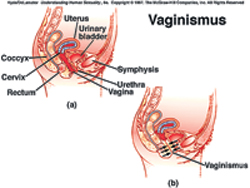|
CLOSING UP
"Vaginismus is a condition that affects a woman's ability to have sexual intercourse," says Dr. Kulasiri Buddhakorale, consultant venereologist. Understandably, the latter can and does take a heavy toll on relationships. Symptoms Most women who suffer from vaginismus do not even discover that they have it until they first have sex, says Dr. Buddhakorale. They may find out earlier, while attempting to use a tampon.
"The muscles inside go into a spasm," explains Dr. Buddhakorale. The muscle that is the source of the pain is the PC or pubococcygeus muscle. This hammock shaped muscle, found in both sexes, stretches from the pubic bone to the coccyx (tail bone). It forms the floor of the pelvic cavity and also supports the pelvic organs. It is the PC muscle that controls the urine flow and contracts during orgasm. When this muscle clamps shut, it makes penetration either extremely painful or in many cases, impossible. The severity of vaginismus varies from woman to woman. However, vaginismus can take two forms: Primary vaginismus What happens when a woman has never been able to have sexual intercourse or allowed any other kind of penetration Secondary vaginismus This occurs when a woman who has previously been able to accept penetration, acquires vaginismus for some reason. This can be traced to physical causes such as a yeast infection or trauma during childbirth or may be due to psychological causes.
The cause While vaginismus can be the result of a combination of physiological and psychological factors, the balance weighs heavily in favour of the mental and emotional rather than the physical. "It is a psychological phenomenon," explains Dr. Buddhakorale. Some examples of causes of vaginismus, explains Dr. Buddhakorale are sexual abuse, strict religious upbringing, mutilation of the genitalia, being taught that sex is dirty or wrong or simply the fear of pain associated with penetration, and in particular, losing one's virginity along with the accompanying blood loss.
Many of these ideas come from one’s family or peer groups, he adds. Aside from this, vaginismus can also be caused by STDs (sexually transmitted diseases) such as genital herpes, reveals Dr. Buddhakorale. It is important to remember that the woman does not choose for this to happen, it is a learned reflex reaction. It becomes easier to understand if one compares it to the way we involuntarily close our eyes when an object suddenly comes close. This, like vaginismus is a reflex reaction, which our bodies take to protect us from pain. A woman with vaginismus cannot shake the conviction that severe pain will accompany the penetration and so her mind automatically sends a signal to her PC muscles to clamp shut. Treatment The process of curing vaginismus is usually a long one and will require patience, will power and determination. Vaginismus will not get worse if left untreated unless the woman continues to have sex despite feeling pain on penetration. Dr. Buddhakorale advises strongly against using oils and creams, saying that they will only aggravate the situation. If the cause of vaginismus is psychological then
it is usually important to treat those aspects of the problem as
well as the actual muscle spasm. This is why women with vaginismus
must seriously consider counselling, advises Dr. Buddhakorale. Physically,
a doctor will be able to show a woman how to use exercises and vaginal
dilators to help cope with the muscle spasm.
|
||||||
Copyright © 2006 Wijeya Newspapers
Ltd. All rights reserved. |

